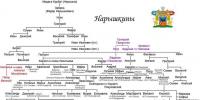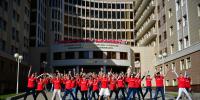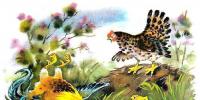Ural State Pedagogical University. GBPOU with Sverdlovsk Regional Pedagogical College Pedagogical College on Yumasheva 20 correspondence department
founded in 1930 as the Ural Industrial- pedagogical institute, from 1933 - S. p. and. The institute (1975) includes: faculties - mathematics, physics, Russian language and literature, foreign languages, geographical and biological, defectology, physical education, music and pedagogy, pedagogy and methodology primary education; correspondence and evening departments; postgraduate school, 34 departments, research sector, computer center. 18 educational laboratories; The library has about 400 thousand items. In the 1974/75 academic year, 6 thousand students studied, 400 teachers worked, including 10 professors and doctors of science, 150 associate professors and candidates of science. Interuniversity thematic collections are published scientific works(260 volumes published, 1975). Over the years of its existence, the institute has trained over 24 thousand specialists.
E. L. Shuvalov.
- - higher pedagogical educational institution. Founded in 1903 on the basis of pedagogical courses at St. Petersburg women's gymnasiums...
- - named after A.I. Herzen, ...
St. Petersburg (encyclopedia)
- - - state higher educational institution in St. Petersburg. Formed in 1816 on the basis of the reorganized St. Petersburg Pedagogical Institute, it had the rights of a university...
- - - higher educational institution of the Department of Institutions of Empress Maria. Basic in 1903, St. Petersburg...
Pedagogical terminological dictionary
- - EKATERINBURG PEDAGOGICAL INSTITUTE - founded in 1930 as the Ural Industrial Pedagogical Institute, reorganized into a pedagogical institute in 1933...
- - named after V. B. Vakhrushev State. Committee on Public Education of the RSFSR - first technical. university in the Urals. In 1914, the Ural Forge was founded in Ekaterinburg. institute...
Geological encyclopedia
- - In 1786, for the education of teachers in the main public schools, the Teachers' Seminary was established, renamed in 1803 into the Teachers' Gymnasium. The students in both were government-paid students...
- - see Women's education...
Encyclopedic Dictionary of Brockhaus and Euphron
- - a higher pedagogical closed educational institution, established according to the charter on December 23, 1816 on the basis of the reorganized St. Petersburg Pedagogical Institute...
- - founded in 1920 as an institute of public education, in 1921 reorganized into the pedagogical faculty of Irkutsk University, since 1931 - again an independent pedagogical institute...
Great Soviet Encyclopedia
- - them. Abay, founded in Almaty in 1928 consisting of 3 branches. Since 1930 an independent university. In 1935 K. p.i. named after Abay Kunanbayev...
Great Soviet Encyclopedia
- - them. A. M. Gorky, founded in 1920 as the Faculty of Social Education of the Kyiv Institute of Public Education, since 1930 the Institute of Social Education, since 1933 ...
Great Soviet Encyclopedia
- - Baku, founded in 1921. In the 50-60s. a number of pedagogical universities...
- - WOMEN'S PEDAGOGICAL Institute - since 1903, St. Petersburg, higher educational institution of the Department of Institutions of Empress Maria...
Large encyclopedic dictionary
- - founded in 1920. Prepares teachers for secondary schools, educators preschool institutions etc. In 1991 approx. 6 thousand students...
Large encyclopedic dictionary
- - founded in 1920. Prepares teachers for primary and high school, educators, special education teachers, etc. In 1990, approx. 13.8 thousand students...
Large encyclopedic dictionary
"Sverdlovsk Pedagogical Institute" in books
TSB From the book Big Soviet Encyclopedia(MO) of the author TSB From the book Great Soviet Encyclopedia (MO) by the author TSB From the book Great Soviet Encyclopedia (PE) by the author TSBIn August 1922 in Yekaterinburg at the address: st. Mechanical, 6, the Yekaterinburg Pedagogical College was opened for 120 people with a teaching staff of 22 people. The Pedagogical College had 2 departments: school and preschool. First director Dmitry Alexandrovich Kiselev.
Since April 1993, the pedagogical school was reorganized into the Yekaterinburg Regional Pedagogical School 1.
Since June 1995, the Yekaterinburg Pedagogical School received the status of a college and was renamed the Sverdlovsk Regional teacher training college.
This year was the first time in Sverdlovsk region admission to the college in the specialties of Mathematics, Russian language and literature was carried out, Foreign language, Story. Actual acquisition of the status of an educational institution higher level(college) has occurred since 1997, when the college, along with other areas of activity, carries out research and scientific-methodological activities of college students and teachers.
There is a change in priorities in the implementation of areas (specialties) of specialist training, which consists in the opening of new specialties - Geography (since 1999), Home education(since 1998), development of non-traditional medium-sized systems teacher education specialties (for example, State and municipal government). In 2000, the last graduation of specialists in the specialty Preschool Education was carried out.
Education at the college is carried out both full-time and correspondence forms training. The content and structure of training allows college graduates to continue their studies at universities. During this period, college enrollment stabilizes at 225.
Since 1997, students have been studying at the college in the targeted areas of the municipal educational authorities of the region, with full reimbursement of tuition costs (on a contractual basis) by individuals or legal entities. College graduates, and today there are about 30 thousand of them, work in educational institutions of various types and types.
From 2006 to the present, he has been directorT.S. Simonova.
Today the college offers 12 specialties, 36 groups.
The uniqueness of the Sverdlovsk Regional Pedagogical College is that:
- only in this educational institution of the Sverdlovsk region specialists are trained in the specialties History, Geography and State and municipal administration, Home Science;
- The college carries out extensive research work annual conferences students of pedagogical colleges and teachers of teacher education and in April 2007 the 10th anniversary conference of teachers of pedagogical colleges of the region was held;
- in 2003, the college opened a program continuing education with the Faculty of Philosophy of the Ural State University them. Gorky and began training college students with a specialization in Social Management;
- the college operates:
Sports center with active tennis courts, massage room, fitness rooms, gym, solarium, sauna;
Center for advanced training for management and teaching staff of the Sverdlovsk region;
School Leader for schoolchildren of the region,
Educational Resource Center;
Information and methodological center with periodical rooms, 4 computer classes, local resources computer network, a diverse media fund, the ability to work on the Internet
- Sverdlovsk Regional Pedagogical College, as a partner of the non-profit corporation Project Harmony Inc., is the official training platform of the Intel Learning for the Future program;
- Since 2007, the college has a regional branch of the All-Russian public youth organization? All-Russian Student Rescue Corps?.
Today, the Sverdlovsk Regional Pedagogical College is a multi-structure, mobile, modern educational institution that gives a good start to success in life!
| "Ural State Pedagogical University" (USPU) |
|
|---|---|
| Former names | Sverdlovsk State Pedagogical Institute |
| Motto | Docere et discrete |
| Year of foundation | |
| Type | State |
| Rector | Simonova, Alevtina Alexandrovna |
| Location | Russia Russia, Ekaterinburg |
| Legal address | Ekaterinburg, Kosmonavtov Ave., 26 |
| Website | www.uspu.ru |
| Awards | |
"Ural State Pedagogical University" (USPU) - federal state budgetary educational institution higher education, founded in 1930, one of the oldest universities in the Urals.
More than 20 thousand students study full-time and part-time. There are postgraduate and doctoral studies, 11 dissertation councils. In terms of the number of full-time students (about 6,500), it ranks second out of 17 universities in the Sverdlovsk region (after the Ural Federal University named after B. N. Yeltsin). In 2010, ranked 5th out of 71 according to National rating universities among pedagogical, humanitarian and linguistic universities.
In 2007, based on the results of an examination of the network project “Innovations in Education,” the university received the status of an innovative enterprise, confirming this title in 2010 and 2012.
In 2012, according to the results of “Public control over admission procedures to universities as a condition for ensuring equal access to education,” conducted by order of the Public Chamber of Russia, USPU took 4th place among 43 pedagogical universities in Russia.
Encyclopedic YouTube
-
1 / 5
Views:
Faculties
Institutes
- Institute of Fundamental Social and Humanitarian Education
- Faculty of Law
- Faculty of Economics
- Faculty of Sociology
- Institute of Social Education
- Department of Social Pedagogy
- Advertising and Public Relations
- Histories and theories of social work
- Social work technologies
- Institute of Personnel Development and Management
- Department of Theory and Practice of Organization Management
- Department of Acmeology and Management Psychology
- Department of Continuing Education
- Department of Higher vocational education
- Institute of Pedagogy and Childhood Psychology
- Center additional education IPiPD
- Center for correspondence and e-learning
- Faculty of Pedagogy and Psychology of Preschool Education
- Department of Pedagogy and Childhood Psychology
- Department of Theory and Methods of Education for a Culture of Creativity
- Faculty of Pedagogy and Methods of Primary Education
- Department of Russian language and methods of teaching it in primary school
- Department of Theory and Methods of Teaching Natural Science, Mathematics and Computer Science in Childhood
- Department of Pedagogy
- Institute of Special Education
- Regional computer center
- Qualification Test Center
- Center for Psychological and Pedagogical Support of Vocational Education of Persons with Disabilities
- Faculty of PC and PP for Special Education Workers
- Faculty of Correctional Pedagogy
- University of the Foreign languages
- Department of German Philology
- Department in English, methods and translation studies
- Department of English Philology and Comparative Linguistics
- Department of Romance Languages
- Department of Professionally Oriented Language Education
- Institute of Fundamental Psychological and Pedagogical Education
- Department of Higher Pedagogical Education
- Department of Anatomy, Physiology and Valeology
- Department of Psychology
- Department of Age-related Pedagogy and Pedagogical Technologies
- Department general pedagogy and history of education
- Institute of Psychology
- Department of General Psychology
- Department of Educational Psychology
- Department of Social Psychology, Conflictology and Management
- Institute of Philology, Cultural Studies and Intercultural Communication
- Department of Rhetoric and Intercultural Communication
- Department of Modern Russian Literature
- Department of Theory and Methods of Teaching Russian Language
- Department of Russian and Foreign Literature
- Department of General Linguistics and Russian Language
- Institute of Physics and Technology
- Department of General Physics and Natural Sciences
- Department of Theoretical Physics
- Department of MP Physics and TSO
- Department of General Technical Disciplines
- Department of Technology
- Institute of Music and Art Education
- Department of Singing and Music Education Methods
- Department of Theory and History of Music and Muses. tools
- Department of Art Education
- Institute of Mathematics, Informatics and Information Technologies
- Department of Informatics, Computer Science and Teaching Methods
- Department of Information Technologies
- Department of NIT in Education
NOTEBOOK
PRACTITIONER
Professional module 01
Specialty 51.02.02 “Social and cultural activities”
Academic year _______2017___________________________________________________
Ekaterinburg
Trainee's notebook:
for specialty students
Social and cultural activities"
Ekaterinburg: GBPOU SO SOPC.-2017
Kasyanova Elena Borisovna – head of the department of management in social sphere
This manual creates organizational and methodological grounds for conducting internships for students of pedagogical colleges in specialty 071801 “Social and cultural activities.”
The manual is intended for leaders of teaching practices, methodologists and students of pedagogical colleges.
Kasyanova E.B., 2017
Sverdlovsk Regional Pedagogical College, 2017
Explanatory note
Workbook trainee within the framework of the professional module “Organization of social cultural activities» developed with the aim of mastering the specified type of professional activity and the corresponding professional competencies.
During the development of the professional module, the student must:
have practical experience:
· organization of social and cultural activities in cultural and leisure institutions;
· development of socio-cultural programs;
· preparation of plans, reports, cost estimates;
be able to:
· provide consulting and methodological assistance to cultural, leisure and educational institutions for the development of socio-cultural activities;
· analyze the regional characteristics of socio-cultural activities and participate in its development, manage the structural unit of the institution of the socio-cultural sphere;
· conduct and process the results of specific sociological research;
· analyze and draw up plans, reports, cost estimates, business plans;
know:
· main types and stages of formation and development of socio-cultural activities in Russia;
· main types, forms and trends in the development of socio-cultural activities in the region;
· structure of management of socio-cultural activities;
· the concept of subjects of socio-cultural activity;
· theoretical basis And general techniques organization and development of socio-cultural activities in various types of cultural, leisure and educational institutions;
· modern socio-cultural technologies, socio-cultural programs;
· specific methodology sociological research;
· specifics and forms of methodological support for the industry;
· economic fundamentals of the activities of institutions of the socio-cultural sphere and their structural divisions;
· economic mechanism, forms and structures of organizing economic activity;
· composition and features of estimated financing and budgetary regulation of expenses;
· types of extra-budgetary funds, sources of their receipt, business planning methods;
· principles of labor organization and wages
The result of mastering the professional module is the students’ mastery of organizational and managerial professional activity, including professional (PC) and general (GC) competencies:
| Code | Name of learning outcome |
| PC 1.1 | Develop and implement socio-cultural projects and programs. |
| PC 1.2 | Organize cultural and educational work. |
| PC 1.3 | Provide differentiated cultural services to the population in accordance with age categories. |
| PC 1.4 | Create conditions for attracting the population to cultural, leisure and creative activities. |
| PC 1.5 | Use modern methods organization of social and cultural activities. |
| PC 1.6 | Analyze the state of the socio-cultural situation in the region and cultural institution. |
| PC 1.7 | Determine priority areas of socio-cultural activities. |
| OK 1 | Understand the essence and social significance of your future profession, show a steady interest in her. |
| OK 2 | Organize your own activities, determine methods and means of performing professional tasks, evaluate their effectiveness and quality. |
| OK 3 | Solve problems, assess risks and make decisions in non-standard situations. |
| OK 4 | Search, analyze and evaluate information necessary for setting and solving professional problems, professional and personal development. |
| OK 5 | Use information and communication technologies to improve professional activities. |
| OK 6 | Work in a team, ensure its cohesion, communicate effectively with colleagues, management, and consumers |
| OK 7 | Set goals, motivate the activities of subordinates, organize and control their work, taking responsibility for the results of completing tasks. |
| OK 8 | Independently determine the tasks of professional and personal development, engage in self-education, and consciously plan professional development. |
| OK 9 | To navigate the conditions of frequent changes in technology in professional activities. |
| OK 10 | Perform military duties, including using acquired professional knowledge (for young men) |
Mastery of competencies as the main result of mastering a professional module can be mastered during educational and industrial practice.
Training practice – 6 days, concentrated
Purpose of practice:
Familiarization with the organization of socio-cultural activities in cultural and leisure institutions of various types and different forms of ownership
Practice objectives:
Describe the institution: type, form of ownership, organizational structure;
Familiarize yourself with the main activities of the organization (institution);
Familiarize yourself with the content of social and cultural programs;
Familiarize yourself with the structure and content of the main documents for a specific event: Charter, reports;
Attend a cultural event or rehearsal session.
Industrial practice – concentrated
Purpose of practice:
Development and conduct of sociological research
Practice objectives:
Analysis of social and cultural programs and events implemented in the organization (institution);
Determining the target audience of a socio-cultural event;
Studying the preferences of the target audience regarding leisure activities, forms and themes of social and cultural events, time and location;
Study current problems cultural institutions or management of an institution (organization) in the field of culture.
EDUCATIONAL PRACTICE
Task No. 1. Describe the procedure and conditions for working with clients of the campaign (on excursion)
The client contacts the company by phone or email and indicates the service he wants to order from the company. Next, a meeting is scheduled with the customer. When the client arrives, the director or art manager talks to him, asks what he wants (what event, scale, presenter, etc.), later the art manager convinces him, tells him why this or that presenter is good, and shows videos from events When everything has been agreed upon, they have come to the same opinion, and they draw up a service agreement.
Task No. 2. Tell us about the structure of the site...Your wishes to the management of the campaign to change the site.
The website contains all the information for a person who wants to book an event. When you click on the link to the site, the main page opens with brief information about the company and service icons, at the top of the page there are links to thematic sections and all the necessary contact information is indicated, which is quite convenient. There is the entire staff, video archive from organized events.
Task No. 1. (according to the newspaper). Tell us about the main projects of the Opera House over the past few months.
Over the past few months, the opera house has been mainly busy with preparations for and participation in the Golden Mask festival. Two works from last season are participating in this festival - “Carmen” by Georges Bizet and “Romeo and Juliet” by Sergei Prokofiev, choreographed by Vyacheslav Samodurov. The third performance, the Russian theatrical premiere of “The Passenger” by Mieczyslaw Weinberg, was shown at the Bolshoi Theater as part of the program of the international forum “Mieczyslaw Weinberg. Return."
Task “No. 2 List all the ways to promote and advertise the Golden Mask festival, in which the Opera House took part. (according to the newspaper)
Thanks to the participation and nomination of the Yekaterinburg Academic Opera House, the Golden Mask festival was widely publicized in the media of the Sverdlovsk region. And its first participants were the artists of the children's choir of the Yekaterinburg theater.
Task No. 3. Press reviews about the Opera Theater's tour in Moscow. (based on newspaper materials)
Task No. 4
Sverdlovsk Regional Pedagogical College
NOTEBOOK
PRACTITIONER
Professional module 01
"Organizational and management activities"
Educational practice “Acquaintance with the specifics of socio-cultural activities of cultural and leisure institutions”
Industrial practice “Development of socio-cultural programs”
Faculty of________________Social________________________________________________
___________2___________courses___________23-k____________________groups
Full name ____Shutrova Victoria Aleksandrovna______________________________



